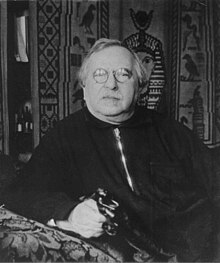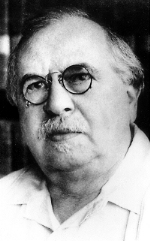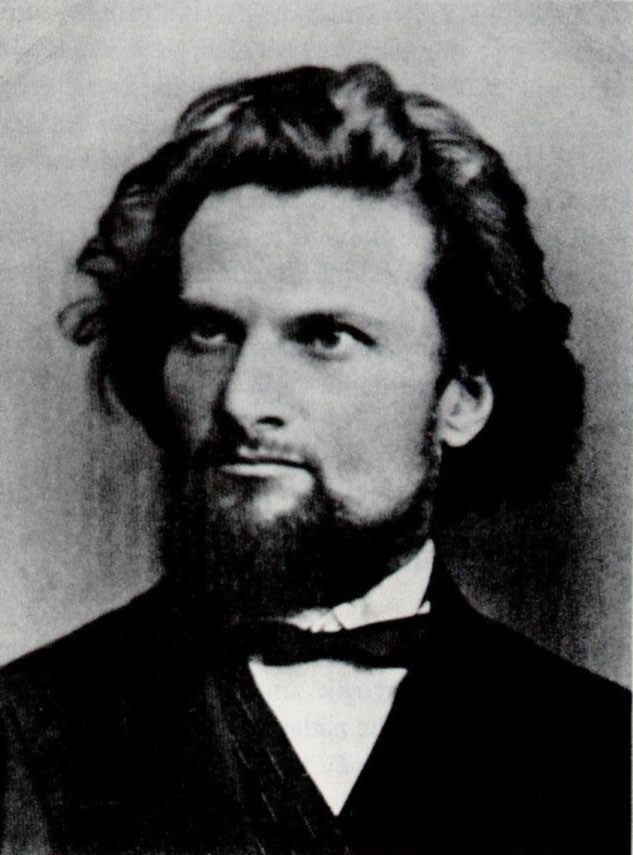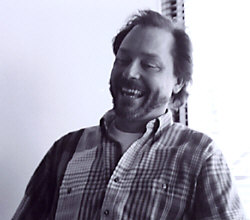Constantin Brunner
Constantin Brunner ( born August 27, 1862 in Altona, † August 27 1937 in The Hague) was the pseudonym of the German - Jewish philosopher, writer, literary critic and agents Aryeh Yehuda Wertheimer (nickname: Leo Wertheimer ). Due to its Rufnamens found in depictions of his person and the false assumption his full name was Leopold Wertheimer been. Brunner is considered a representative of holism and turned in several writings equally against anti-Semitism to Zionism as to propagate his idea of the Jewish emancipation in the same step.
- 3.1 Brunner and anti-Semitism
- 7.1 Letters Edition Project
- 7.2 Letter Tradition
Life and work
Youth and education in Altona, Cologne, Berlin and Freiburg
As the grandson Akiba Wertheimer, the Higher Regional Rabbi of Altona and Schleswig -Holstein, Leo Wertheimer was brought up in the orthodox Jewish faith and studied in Cologne at the Jewish Teachers' Seminary. Looking for the "best" religion, he broke off his studies. Comparative religion were now at the center of his interest. In Berlin and Freiburg, he studied from 1884 to 1888 Philosophy and History. Jew-hatred and anti-Semitism, as they met him there were his central preoccupation. In 1882 he wrote his first work, "The speech of the Jews" (first published 1918), in which he deals with anti-Semitism, religious history, the possibility of Jewish emancipation in Germany and with philosophical questions.
Brunner studied with the neo-Kantian philosopher Alois Riehl and was at times the philosophy of Immanuel Kant connected. Later he became one of the sharpest critics of Kantianism. When Eduard Zeller, he acquired knowledge of Greek philosophy. Had influences in the study to Brunner, the Indian and the philosophy of Arthur Schopenhauer, which provided him with Paul Deussen. There are also thinking Wilhelm Dilthey and the Julius Ebbinghaus, the newer Ethnology Adolf Bastian and the lessons from the zoologist August Weismann. Brunner criticized Darwinism.
His study of the Kantian philosophy was followed by a thorough examination of Georg Wilhelm Friedrich Hegel, and finally with Baruch Spinoza. On Spinoza he estimated the "true" and "active" philosophy and its feasibility into practical life. Brunner saw in Spinoza, as in Moses, Socrates, Buddha and Jesus people he referred to as geniuses or as " spiritual ," which combine life and work and thereby mediate the one everlasting and everywhere the same absolute spiritual truth.
As a literary critic and brokers in Hamburg
After studying Constantin Brunner worked since 1891 as a literary critic in Hamburg. Brunner befriended while with Detlev von Liliencron, Gustav Falke and Richard Dehmel. He founded a literary agency, from 1893, the magazine " The Spectator " emerged that he ( "Nevertheless, friend " who in his later writing materialism and idealism ) issued along with Leo Berg and Otto Ernst. In it, he used his pseudonym Constantin Brunner. He had this name then register as a real name. " The Spectator " is aimed at the multipliers in the literary world. The journal represents a practical aesthetic that must be based on the empirical sciences. Argues for a sensual imagination and rich poetry and descriptive representation of abstract concepts. In contrast, the " Aufbrütesame " will, "Max Stirner and Nietzsche's influence with the great confusion of ideas that has come through socialism, individualism, pessimism in so many minds ," criticized from the unproductive for artistic creation. Significantly Brunner used since 1893 against the scholastic term thinking, the Judeo-Christian religion and the hatred of Jews.
As a philosopher and writer in Berlin and Potsdam
Although Brunner yet published in his time in Hamburg important for his philosophy essay "On the art of artistic creation ", but only after he had moved to Berlin the end of 1895, began a more extensive elaboration of his philosophy. The reason for the change from work to go to the concentration on one's own philosophy was a cultural experience in 1895 was Brunner inspired during a museum visit in London by the sculpture "barter Western " in his philosophy fundamentally.
In the same year, 1895, he married Rosalie, born Auerbach, who called herself the future Leonie, in reference to Brunner's nickname Leo. With her daughter Elise Charlotte, born Auerbach, who henceforth bore the name Lotte Brunner, Brunner later joined an intensive exchange of literature and philosophy. Lotte Brunner published under the pseudonym of EC value Henau and led from 1903 to 1932 a diary of observations Brunner to his philosophy and visits and discussions in the home Brunner.
After moving from Hamburg Brunner devoted almost exclusively to his family, his friendship, inter alia, with Gustav Landauer and his philosophy. By the support of his friend Frida Moon and her son Lord Alfred Melchett he was financially independent in Berlin and erwerblicher free from the constraints of operation.
1908 led the thirteen -year-long elaboration of his philosophy in publishing his book "The doctrine of the spiritual and the people ". Gustav Landauer, the Brunner worked at that time and was on friendly terms, Brunner assisted in the publication.
Brunner has worked extensively on Spinoza and had close contacts with the Spinoza researchers of his time, such as Carl Gebhardt, Adolph S. Oko, Stanislaus von Dunin- Borkowski. Ernst Altkirch he suggested, besides, to the work " Spinoza: A Portrait " (1913) and " Maledictus and Benedictus " ( 1924). At the publication KO Meinsmas book " Spinoza and his circle " (1909 ) in German language, he worked at the editorial office with and wrote a preface to this work, which in 1910 under the programmatic for Brunner entitled " Spinoza to Kant and the cause of spiritual truth " was published independently.
Among the students at Brunner, who gathered in the field founded by Fritz Blank " Constantin Brunner community " in Berlin, were George Goetz, Fritz Ritter and Ernst Ludwig Pinner.
However, more important for the discussion of Brunner was headed by Friedrich Brunner Kettner Study Group in Czernowitz, the so-called "Ethical Seminar". These included the biologist Israel Eisenstein, author of " error and truth of biology - criticism of the theory of evolution ", and the psychologist Walter Bernard. The forming from the Seminar " Brunner of Friends " belonged to both Lothar Bickel, certain of Brunner executors, and the poetess Rose Auslander, a longtime close friend of Brunner.
The Hague exile
Brunner warned early on about the dangers of Nazism and had become not only because of his Jewish origin, but also for his statements against Nazism to a declared enemy of the Nazis in 1933 and fled into exile in The Hague. There he was cared for by his pupil Magdalena Kasch. His books were burned and banned.
In exile, Brunner sought his work " Our character or I'm the one! " To complete. Brunner characterized it as a " self-conscious self-deception " in people, "his natural egoism " do not want to admit it and " arrogant moralizing believes to be right. "
Posterity
The Friends Brunner was brutally crushed by the Nazis. After 1945, it proved impossible to continue.
Magdalena Kasch, which could save many writings Brunner, founded by survivors of the Internationaal Instituut Constantin Brunner ( ICBI ) in The Hague.
Brunner's thinking is characterized as holism. Significant political positions highlight its commitment to the emancipation of the Jews in Germany and Judaism, as well as his anti - Zionist attitude and ideology critique.
Yehudi Menuhin, Ferdinand Alquié, André Breton and the Hamburg literary historian and essayist Heinz Stolte related to the thinking Constantin Brunner.
Descent
Brunner comes from a family of Altona Torah scholar. Best known is his grandfather, the first Chief Rabbi of the country Altona and Schleswig -Holstein, Akiba Wertheimer Israel.
Philosophy
The " Internationaal Constantin Brunner Instituut " ( ICBI ) Brunner describes the doctrine of the spiritual and the people (1908), which lays the foundations of his philosophy as follows: " The distinction of three faculties ' of thinking - the practical, the mental and analogical - sets Brunner in this book the foundation of his philosophy. Since, according to him the practical thinking of man is founded necessary either to the true, spiritual or on the fictional, analogical principle, he comes to the thesis of a demonstrable throughout the entire history through antagonism between spiritual and superstitious thinking people. The analogical thinking is not a pure but a confused absolute, that is, a absolutizes practical thinking. Basic to his teaching is the not explorable distinction between the absolute and the relative intellectual, practical thinking, which goes back to Spinoza difference between substance and attribute. (...) His theory of motion leads to a psychology without a soul ', and finally in a, pneumatology ', in Brunner, the origin of our consciousness from the soulfulness of the world is derived. In numerous digressions, he emphasizes the scholastic moralism of Kant, he faces the logically thought out philosophy of Spinoza. "
Brunner and anti-Semitism
Elias Rottner: " The term anti-Semitism gets in the book [ The hatred of the Jews and the Jews ( 1st edition, 1918) ] its rightful place, namely about misanthropy, which is psychologically developed as thoroughly as original. (The word anti-Semitism is rejected by Brunner as euphemistisches, misleading Tarnwort. ) Moreover, the hatred of Jews as a people, nation and state - corrupting and destructive mass psychosis is proven unequivocally. The topic is very closely linked to the concepts of state, nation, politics, political parties, individual, culture and culture -supporting thoughts. "
Writings
- Speech of the Jews: We want him back! ( Originated in 1893 / not published; 1918 changes published in: The hatred of the Jews and the Jews p there.) Stuttgart 1969.
- The doctrine of the spiritual and the people. Stuttgart (1908, 1927) 1962.
- The hatred of the Jews and the Jews (1913 written in 1918, 1919, 1974) Berlin 2004.
- The reign of pride ( Memscheleth Sadon ). Last word about the hatred of the Jews and the Jews ( 1920), Stuttgart 1969.
- Our Christ or the nature of genius ( 1921) Cologne - Berlin 1958
- The hatred of Jews and thinking (1922), The Hague 1974.
- Love, marriage, husband and wife (1924), Stuttgart 1965.
- From Constantin Brunner hermit Potsdam 1924
- From my diary (1928), Stuttgart 1967.
- Materialism and Idealism (1928, 1959) Cologne - Berlin 1976.
- Of the deeds of the Jews and of the responsibilities of the State, Berlin, 1930.
- Listen Listen Israel and non- Israel ( The Witches ) ( 1931), The Hague 1974.
- The unmasked man (1933 arose 1951 abridged) The Hague 1953.
- Our character, or I 'm the right guy! ( posthumously 1939), 1964.
- Art, philosophy, music. ( Collected Essays ), Zurich 1940
- Legacy The Hague in 1952, Darin: rules of life, on March 6, Over The necessary self- emancipation of the German Jews, the afterword to my will, speech on the seventieth birthday among others
- From the mind and of the folly ( Collected Essays ) Hamburg 1971
- Selected Letters 1884-1937, ed. by Jürgen Stenzel and Irene Aue- Ben David, Wallenstein Publisher: Göttingen 2012, 608 pp., ISBN 3835310941
Introductions to philosophy Brunner
- Mary Behre: Eve, where are you? Effect of female power at the plant rose foreigner. Berlin 2005, ISBN 3-86575-271-3. ( particularly the chapter Rose foreigner Mythokonzept Eve as relational thinking by Constantin Brunner. pp. 52-64 )
- Walter Bernard: The Philosophy of Spinoza and Brunner. New York 1934.
- Hans Goetz: Philosophy as quality of life ( essays and lectures ). Munster 2006, ISBN 3-86582-401-3.
- Phoebus Grünberg: The term philosophy in teaching Brunner. The Hague 1985.
- Martin A. Hainz: »more [ ... ] as an outer form" - the poetry rose foreigner and their philosophical influences. In: Jacques Lajarrige and Marie -Hélène Queval (ed.): Lectures d' une oeuvre - poems de Rose foreigners. Nantes 2005, pp. 69-82.
- Hendrik Matthes: Waarheid s Bijgeloof. Leende 1999, ISBN 90-5573-075-2 (formally wrong ISBN ).
- Hendrik Matthes: Constantin Brunner, An Introduction. Dusseldorf 2000, ISBN 3-930450-52-6.
- Jürgen Stenzel: Philosophy as an anti- metaphysics. For Spinoza image Constantin Brunner. Würzburg 2002, ISBN 3-8260-2071-5.
- Jürgen Stenzel: The philosophy of Constantin Brunner. Essen 2003, ISBN 3-89924-024-3.
- Heinz Stolte: From the fire of truth. Hamburg in 1968, Husum, 1990 ( expanded edition ), ISBN 3-920421-57-4.
- Heinz Stolte: Het Vuur the Waarheid. The Hague 1969.










